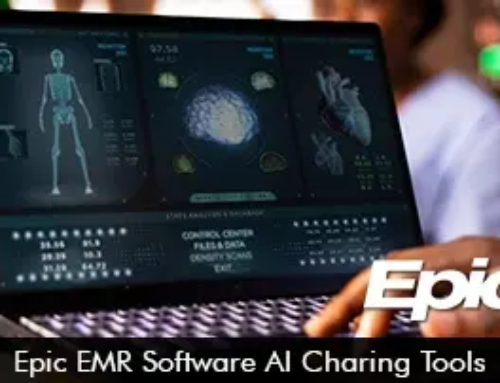Since the introduction of the EMR mandate, medical providers have been using Electronic Health Records software to store and manage patient data. With all the benefits and drawbacks, health professionals have now spent years adapting their workflows to this new technology, and not without challenge.
However, with artificial intelligence now in demand more than ever, things might shake up once again. Since the introduction of Google in 1998, we may be witnessing one of the most impactful and influential technological innovations of the past 50 years.
The benefits of AI in EMR software
Currently healthcare organizations are leveraging AI in numerous ways, in clinical and backend operations, and there are a few benefits to be had:
- Improved efficiency
- Improved speed and efficiency in documentation.
- Reduced errors
- Can help reduce human error in documentation and prescriptions and dosages.
- Natural Language Processing
- Can streamline EHR software documentation, improve efficiency, and even facilitate interoperability.
- Clinical support
- Provide real-time suggestions, recommendations, and alerts to medical professionals.
- Improved communication
- Using NLP for patient portals can also help patients better understand key terms and concepts, allowing them to have more in-depth and engaging discussions with healthcare providers.
Huge companies are investing hugely in Generative AI
The healthcare AI industry has been growing a lot, even before ChatGPT’s release, valued at $11.06 billion globally in 2021. This is predicted to rise as high as a staggering $187.95 billion in 2030, so it’s no surprise to hear some of the biggest names in technology (and other sectors too) getting involved.
Some of the five biggest investors in Artificial Intelligence and Healthcare AI include:
Microsoft
Microsoft’s Azure OpenAI serves is for developers to integrate several AI capabilities into their applications including natural language processing (NLP), computer vision, and more. Several of the biggest EHR software vendors have already utilized the service including Epic EHR and eClinicalWorks.
Additionally, in May 2023 Mircosoft announced their new data analytics platform, Microsoft Fabric, which integrates with their current AI platforms. They have also announced plans to introduce new AI solutions for healthcare organizations at this year’s HLTH conference.
Notably, Microsoft was early to invest $1 billion into OpenAI in 2019, 3 years prior to the release of ChatGPT. This investment is now valued at around $13 billion, with OpenAI’s valuation reportedly reaching $29 billion.
IBM (The International Business Machines Corporation)
Having invested nearly $200 million in artificial intelligence and being named the 2023 IDC Artificial Intelligence Services Marketscape, IBM has developed watsonX (an AI and data platform) available for organizations – including in healthcare.
With recent developments to watsonX, IBM partnered with Ovum Health to integrate watsonX’s generative AI capabilities with their web-based and mobile chat and scheduling applications.
Google has invested an immense $30 billion into artificial intelligence, using the technology across its various platforms, and recently released its generative artificial intelligence chatbot, Bard. Along with Bard, Google is developing Med-PaLM 2, a large language model specifically fine-tuned for the healthcare and medical space.
They’re currently researching different applications for Med-PaLM 2 and other deep learning models such as genomic analysis, healthcare research, disease prediction, and Electronic Health Records software.
Amazon (AWS)
Amazon Web Services Inc. (AWS) announced their generative AI offering: AWS Healthscribe, which uses both speech recognition and AI to generate clinical documentation – and it’s a fully HIPPA-eligible service.
AWS Healthscribe provides a platform for healthcare professionals to easily integrate generative AI with their Electronic Health Records software and has so far been released for orthopedics and general medicine.
Amazon also announced their collaboration with Anthropic, to develop generative AI tools utilizing AWS’ machine learning accelerators, putting their investment in the sector at roughly $4-10 billion.
Oracle
Most known in healthcare for their acquisition of Cerner (for $28 billion), Oracle also boasts a broad range of AI and Machine Learning services. Oracles services are available for a wide array of industries including healthcare.
Oracle has been leveraging the power of generative AI to automate partial upgrades to Cerner Millenium’s EHR software system.
Healthcare AI now and in the future
Artificial intelligence has long been a sought-after technology in healthcare IT. eClinicalWorks has long had its machine learning virtual assistant, Eva, as early as 2018. Of course, they’re now also looking to integrate ChatGPT and other AI models into their software via Microsoft’s Azure Open AI.
Hint Health, the EMR software vendor, also recently partnered with OpenAI to develop a new medical transcription tool, testing it with Direct Primary Care (DPC) practices. They have also publicized plans to integrate a ChatGPT-like tool into their EHR software solution.
Deep learning tools also hold great promise for other areas of healthcare. They can be applied to:
- Protein analysis
- Aid in developing new medicines
- And boost preventative healthcare
- using predictive models to identify potentially ill patients before symptoms develop.
Hint’s view on the technology seems more tempered, however, as Hint Health CEO, Zak Holdsworth, stated: health IT software advancements in recent years have not delivered anything truly transformative but have “essentially helped reinforce the existing incentives in the system”.
Key concerns of Artificial Intelligence
It’s important to note that as exciting as it may be, artificial intelligence is still in its infancy. There are some major issues such as:
- Data bias
- With machine learning algorithms, there comes the issue of potentially forming biases in predictive models.
- Reliability
- Whilst also referring to the trustworthiness of the software itself, another issue is how well AI software can judge the reliability of data that it analyses and uses for its algorithms.
- Responsibility
- Over-reliance on software can also be a problem for healthcare practices. AI should be used as a tool to supplement our current workflows, not replace them.
Conclusion
The future of healthcare AI is undoubtedly one of the most exciting prospects, in recent years, for EHR software and healthcare. With major companies like Google, IBM, and Microsoft all investing massively into the technology, there’s no telling how far artificial intelligence can truly develop medicine and healthcare.
Though, of course, it’s only a dream at this point. With all its benefits and faults, it may be wise to exercise trepidation.








